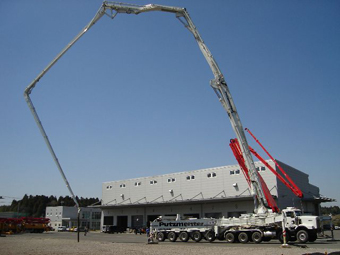Chinese respect for German tech?
 BERLIN - As workers struggled to contain the Fukushima nuclear disaster in March 2011, the head of German company Putzmeister in Japan rerouted one of its special boom trucks floating in the Pacific Ocean to the disaster site.
BERLIN - As workers struggled to contain the Fukushima nuclear disaster in March 2011, the head of German company Putzmeister in Japan rerouted one of its special boom trucks floating in the Pacific Ocean to the disaster site.The truck - originally designed to pump concrete - proved so effective in cooling the station’s reactors with ocean water, that TEPCO (Tokyo Electric Power Company) immediately requested more of Putzmeister’s trucks - including two of the only three 70Z units in the world.
Nicknamed the “Juggernaut”, the 70Z gets its name from its massive 70-yard boom (nearly the length of a football field), which allowed it to pump some 700 gallons of water per minute into the Fukushima reactor, meanwhile keeping workers as far as possible from what had become ground zero in the disaster.
Less than a year on, Chinese industrial company Sany acquired family-owned Putzmeister, marking one of the biggest Chinese takeovers of a company from Germany’s “Mittelstand” engineering group - seen as a pillar of the country’s economy.
The significance of the acquisition was soon underscored by an Ernst & Young study in June citing Germany as the third most attractive investment opportunity among medium and large-sized Chinese businesses. Appearing on the lists of some 25% of companies surveyed, the European economic leader came in after only the U.S. (29%) and China itself (61%).
According to the study, more than half of those surveyed expressed an interest in mechanical engineering, with the automobile industry coming in second.
“The term ‘Made in Germany’ is famous the world over,” Yi Sun, a partner at Ernst & Young and head of China business services in Germany, Austria and Switzerland, told Germany’s RTL.
“German products speak for quality, which is something Chinese investors value, along with the advanced infrastructure of the country. We’re not talking about hype: this is a long-term trend that will see Chinese investors keep coming.”
German chancellor Angela Merkel has long pushed for Chinese investment in Europe and the Euro, along with her Finance Minister Philipp Rösler, who is under pressure to reconcile a steep imbalance: Germany currently has some 20 billion Euros invested in Chinese businesses, while Chinese investment in Germany amounts to only about 600 million Euros.
“We have to break down the predjudices that these direct investments are harmful: on the contrary, we want them,” n-tv quoted Rösler as saying, underpinning the emotional and psychological barriers that may be standing in the way of more Chinese investment.
But with Germany and China going head to head on worldwide export leadership, trust has been difficult to forge on either side.
“There were concerns that, like American companies and some venture capitalists, the Chinese will suck a company dry, take the filet pieces out, and then dissolve it,” Marc Tenbieg, head of the Deutscher Mittelstands-Bund (DMB), representing over 14,000 small and midsize German businesses, told Bloomberg.
The Putzmeister transaction, however, seemed to speak for a changing tide.
When the takeover was announced, Sany Heavy Industry Chairman Liang Wengen gave public assurance that its German acquisition would continue to produce its current product lines, meanwhile expanding them, and even adding to its own workforce. Whether or not the promises uphold, representatives of Putzmeister’s 3,000-person workforce seem satisfied with the deal.
“We prefer the Chinese because they have a long-term strategy, whereas Anglo-Saxon private equity firms are all about a quick turnaround,” Sieghard Bender, a union leader who had originally organized protests against the takeover, told Bloomberg.
“Sany will do everything to make the Putzmeister deal a success,” Bender said.
The combination of traditional German diligence, infrastructure and experience with Chinese long-term strategy could prove to be a powerful economic marriage. But the success of German-Chinese business relations may depend largely upon whether the integrity of each side’s respective strengths survives the union.
You can return to the main Market News page, or press the Back button on your browser.

